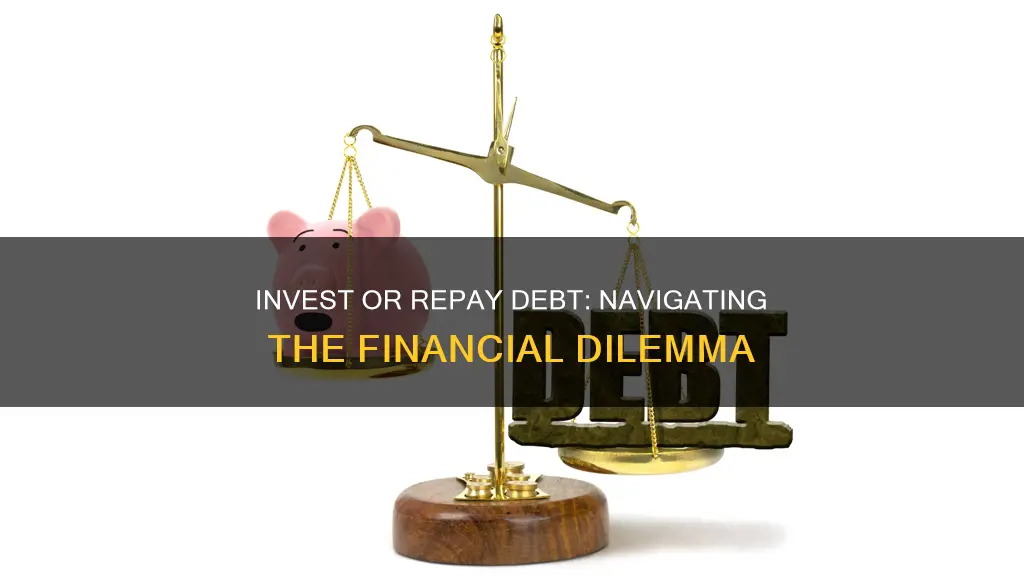
Deciding whether to pay off debt or invest can be challenging. It depends on your individual circumstances, the kind of debt you owe, and your financial goals.
If you have high-interest debt, it is generally recommended to pay this off before investing. This is because the interest rate you pay is likely to be higher than the rate of return on any investment you make. However, if you have debt with a low interest rate, you may want to invest first and pay off the debt later, as the money you earn by investing could outweigh the interest paid on the debt.
Another factor to consider is your risk tolerance. If you are comfortable with risk, you may be more inclined to invest rather than pay off debt. Additionally, it is important to consider your credit score. Carrying a lot of debt can negatively impact your credit score, which can lead to higher interest rates and fewer loan options.
It is also worth noting that investing should be seen as a medium to long-term commitment, and you should be prepared to invest for at least five years to give your investments a chance to grow.
Ultimately, the decision to pay off debt or invest depends on your personal financial situation and goals.
| Characteristics | Values |
|---|---|
| Interest rate on debt | If 6% or greater, pay off debt before investing. If less than 6%, invest instead. |
| Type of debt | Credit card debt should be paid off first. |
| Credit score | Carrying a lot of debt can negatively impact your credit score. |
| Risk tolerance | If debt is causing stress, it may be better to pay it off sooner. |
| Retirement plan | Take advantage of any company retirement plan matches before investing elsewhere. |
| Emergency fund | Save at least 3-6 months' worth of expenses before investing. |
| Tax incentives | Some types of interest, like student loans or mortgages, may offer tax incentives. |
| Investment returns | Historical stock market average annual return is 10%. |
What You'll Learn

Weigh up interest rates and returns
When deciding whether to invest or pay off debt, it is important to weigh up the interest rates and returns. This involves comparing the interest rate on your debt with the expected return on your investments. If the interest rate on your debt is higher than the expected return on your investments, it is generally advisable to prioritise paying off the debt. Conversely, if the expected return on your investments surpasses the interest rate on your debt, investing may be a more favourable option.
For instance, if you have credit card debt with an interest rate of 20%, investing in a stock market index fund yielding a 10% annual return may not be the best decision. In this case, prioritising debt repayment would likely provide a better return on your money. However, it is worth noting that investment returns can fluctuate, and the index fund's performance could vary from year to year.
On the other hand, if you have a mortgage with a 5% interest rate and the stock market index fund is returning 10% annually, investing your extra cash in the index fund may be a wiser choice. This is because you can earn a higher interest rate on your money by investing it rather than paying off the lower-interest debt.
It is important to remember that the decision to invest or pay off debt depends on various factors, including your risk tolerance, credit score, financial goals, and emotional well-being. Additionally, the simple rule of comparing interest rates and returns may not always be easy to apply in practice, as forecasting precise return rates can be challenging even for seasoned experts.
Another factor to consider is the tax implications of your decision. Certain types of interest, such as student loans or mortgages, may offer tax incentives depending on your income. Consulting a tax professional can help you navigate these complexities.
Investor Numbers: Who's in the Game?
You may want to see also

Consider your risk tolerance
When deciding whether to invest or pay off debt, it's important to consider your risk tolerance. This is a measure of the degree of loss you, as an investor, are willing to endure within your portfolio. Your risk tolerance is influenced by your age, investment goals, and income. It also depends on your financial wealth and human capital, which is your ability to generate income from work.
If you have a high-risk tolerance, you are more likely to choose a riskier investment portfolio with higher potential returns. You may be willing to lose money to get potentially better results. Aggressive investors tend to be market-savvy and follow strategies for achieving higher-than-average returns. Their investments emphasize capital appreciation rather than income preservation. This type of investor commonly has a portfolio that includes stocks and little to no allocation to bonds or cash.
On the other hand, if you have a low-risk tolerance, you will likely opt for safer, lower-risk investments with lower potential returns. These investments provide more guaranteed returns and are highly liquid. Examples include bank certificates of deposit (CDs), money market funds, or U.S. Treasuries. Retirees or those approaching retirement age often fall into this category as they seek to protect their principal investment and have a short-term investment strategy.
It's worth noting that your risk tolerance may change over time as your financial circumstances, personal needs, and life situation evolve. Therefore, it's important to regularly reassess your risk tolerance and adjust your investment strategy accordingly.
When deciding between investing and paying off debt, consider the interest rates associated with your debt and compare them to the expected returns on your investments. High-interest credit card debt, for example, can accumulate significant interest over time, making it more costly to pay off. By paying off this type of debt first, you can save money on interest and potentially free up cash to invest or add to your emergency fund.
What Your Peers are Investing In
You may want to see also

Understand the pros of paying off debt first
Paying off debt first can be a great feeling and bring you closer to financial peace. It alleviates the stress that comes with owing money and eliminates monthly payments, giving you more cash on hand each month to put toward other financial goals.
When you pay off debt, you no longer have to worry about paying interest. The longer you owe money, the more interest you'll pay over time. By paying off your debt, you'll save money that you can put toward something you directly benefit from.
Paying off debt can also help you better secure your future. You'll be in a better financial position and will be able to put money that would have gone toward debt payments into an emergency fund, a retirement account, or any other financial goal.
Additionally, eliminating debt can improve your credit score. This is especially true for credit card debt, as it typically carries a high interest rate and can compound quickly, creating a debt spiral. By lowering your credit utilization ratio, you can boost your score and improve your chances of getting loans.
Finally, paying off debt can give you extra financial freedom and improve your quality of life. It can enable you to make major purchases and find ways to save as you pay off debt.
GameStop: The People's Stock
You may want to see also

Understand the pros of investing early
Investing early has several advantages. Here are some of the pros of investing early:
Compound Interest
The longer your money is put to work, the more wealth it will generate in the future. This is due to compound interest, which is interest being earned on interest. The two ingredients for compound interest to be effective are the reinvestment of earnings and time. The longer you invest, the more time your money has to compound.
Risk and Time
The length of time a person has to invest increases the amount of risk they are able to withstand. Younger people with many productive earning years ahead of them can afford to take more risk with their investments. A long investment time horizon enables good years in the market to balance out the bad ones, allowing market returns to come closer to their long-term averages.
Experience
Since investing has a protracted learning curve, young adults are at an advantage because they have years to study the market and refine their strategies in order to avoid investment pitfalls. The experience gained from investing early will play a large part in future investment success.
Tax Advantages
Some types of interest, like student loans or your mortgage, may offer a tax incentive, depending on your income.
Peace of Mind
Debt can be a significant source of stress and anxiety, which can have a negative effect on all aspects of life. Investing early on can give you peace of mind and allow you to focus on other financial, personal, and family goals.
Investing: Control, Returns, and Excitement
You may want to see also

Know when to take a hybrid approach
A hybrid approach that balances paying off debt and investing can be an effective way to achieve both short-term and long-term financial goals. This approach is recommended by most experts. It allows you to make progress toward important financial goals, such as saving for retirement through your company's 401(k) plan. It also gives you more flexibility and enables you to adjust your strategy as your financial situation changes.
- Your interest rate: If the interest rate on your debt is 6% or greater, you should generally focus on paying off the debt before investing additional money toward retirement. This is because the interest you avoid paying is a guaranteed return, whereas the return on investments is not.
- Your investment horizon: If you have a long-term investment horizon, you may be able to take on more risk and invest a larger proportion of your assets in equities. This is because you have more time to recover from any short-term losses.
- Your risk tolerance: If you have a low-risk tolerance, you may want to prioritise paying off debt, especially if it is causing you stress. A hybrid approach may still be suitable, but you would likely want to invest a larger proportion of your assets in fixed-income securities or debt instruments.
- Your financial goals: If you have specific financial goals, such as saving for a house or retirement, a hybrid approach can help you work towards these while also paying off debt.
- Your ability to stay on top of debt payments: If you are struggling to make the minimum payments on your debt, you may need to focus on paying this off before investing. However, if you can comfortably make the payments, a hybrid approach may be suitable.
- Your credit score: If you have a high credit utilisation ratio, it may be affecting your credit score. In this case, you may want to prioritise paying off your debt to improve your credit score.
Remember, the decision to take a hybrid approach depends on your individual circumstances, the kind of debt you owe, and your financial goals. It is always a good idea to consult a financial professional for advice tailored to your situation.
Stable Interest Rates: Investors' Confidence Boost?
You may want to see also
Frequently asked questions
It depends on your financial situation and risk tolerance. If you have high-interest debt, it's generally recommended to pay that off first, especially if the interest rate is higher than what you'd earn by investing. However, if you have low-interest debt, you may want to consider investing first to take advantage of compounding interest and tax benefits.
Paying off high-interest debt first can save you money on interest and improve your credit score. It can also reduce stress and give you more financial flexibility.
Investing early allows you to take advantage of compounding interest and tax benefits. It can also help you build wealth over time and diversify your portfolio.
Yes, you can adopt a hybrid approach by allocating some money towards debt repayment and some towards investing. This approach can help you balance your short-term and long-term financial goals and provide more flexibility.







